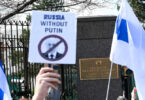BRASILIA (Reuters): Two years ago, the Amazon was aflame, ravaged by arsonists and loggers. Brazilian President Jair Bolsonaro went to war. Air Force C-130 aircraft spewed water and flame retardant over the burning jungle. The effort, in August 2019, launched a new and unprecedented military deployment to quell fires in the world’s largest rainforest. He called it Operation Green Brazil.
“I am authorizing an operation to guarantee law and order,” said Bolsonaro, the far-right president and former paratrooper, announcing the operation. “The armed forces, they readily took action,” he added in a separate speech. But after 19 fruitless months, the military has failed to safeguard the Amazon, a jungle larger than Western Europe that scientists consider a crucial buffer against climate change.
Government data show that deforestation last year surged to a 12-year high. Areas equal to seven times the size of London were destroyed. And Operation Green Brazil has raised the white flag. Late last year, Vice President Hamilton Mourao, a retired Army general and Bolsonaro’s deforestation czar, announced that efforts to protect the rainforest in April will revert to Ibama, the civilian environmental-protection agency the deployment had bigfooted despite its history of success combating deforestation.
The military deployment was part of the Bolsonaro toolkit. In his two-plus years in office, Bolsonaro has turned to soldiers to fill everything from cabinet posts to executive suites at state-run companies to Brazil’s troubled response to the coronavirus pandemic. The failure, according to environmental agents who accompanied soldiers during the deployment, was all but inevitable.
The military, they argue, has neither the tools, the mentality, nor the structure to target and pursue those responsible for the destruction. Its primary objective, national defense, shares few similarities with the law-enforcement expertise and forestry know-how required deep in the jungle, they say. What’s more, many in Brazil’s military, as well as Bolsonaro himself, have historically called for developing the Amazon. They tout the rainforest’s potential as a driver of economic growth and argue that developing the region can help keep covetous foreign powers from using its land, water, and minerals first.
Early in the administration, another former general and top advisor to Bolsonaro shocked many with a video in which he called for damming an Amazon tributary and extending a grain corridor toward Suriname. The project would have quintupled the human population of the northern Amazon, he said. Izabella Teixeira, a leftist and former environment minister, likened the environmental views espoused by Bolsonaro to those of the military dictatorship that sought to populate the Amazon five decades ago. “The current Brazilian government has a 1970s mentality related to natural resources,” Teixeira said. “That to control the forest means to cut it down.” Bolsonaro “thinks that is development.”
Spokespeople for Bolsonaro and the vice presidency referred inquiries for this story to the Defense Ministry. Vice Admiral Carlos Chagas, the ministry official authorized to speak about the deployment, told Reuters the mission to repel those destroying the jungle has been a success. Destruction in recent months has been slightly lower than a year earlier, although still near historic highs for a time of year when logging traditionally wanes. Operation Green Brazil is both a defense of the environment and the country’s territorial integrity, he said. Environmental agents are suitable for routine enforcement of forestry laws, he explained, but the destruction and lawlessness got so bad that the heft and unifying power of the armed forces became necessary.
“Sovereignty means making sure the government of the people knows exactly what is going on inside its own territory,” Chagas said in an interview. “The presence of the military,” he added, “has always been a factor of unification and a factor keeping the country together.” The ministry declined requests by Reuters over the past year to accompany troops on the deployment. For this report, the news agency interviewed dozens of government officials, Ibama agents, and others close to the deployment.
Their previously unreported accounts, providing the most detailed look yet at the mission, portray a military both ill-prepared and reluctant for a task seen as increasingly urgent by scientists, environmentalists and other governments worldwide. Environmental agents told Reuters that the unwieldy mobilization of soldiers slowed operations and curtailed their ability to catch wrongdoers. Instead of rapid raids with a few 4×4 vehicles and a handful of trained agents, outings with the military required big convoys of slow, heavy vehicles.
Officers, agents added, nixed many of the ideas and tactics, like the destruction of logging equipment, they usually employ to stop deforestation. For the people of Latin America’s biggest, most populous country, the operation illustrates the limits of Bolsonaro’s tough-talking approach to governing. Despite promises to restore law, order and prosperity, Brazil remains wracked by a feeble economy, high rates of violent crime and the second-highest COVID death toll in the world.
The Amazon deployment, his opponents say, is one of many examples in which Bolsonaro’s bombast obscures the lack of a real solution. “The military taking over the Amazon is a strong image,” said Marina Silva, another former environment minister, whose success in slashing deforestation early this century made her an icon of the global environmental movement. “But in practice it’s weakening enforcement.” Consider an operation last June that included surprise inspections of lumber yards in the eastern Amazonian state of Para.
Logging is legal in some parts of the rainforest. A web of regulations defines what trees can be felled and where. But ensuring compliance is tricky. Loggers and sawmill operators often try to disguise unauthorized wood as legal. Soldiers, one Ibama agent told Reuters, didn’t know what to look for. During one inspection, sawmillers sought to pass off piles of castanheira, a restricted species, as jequitiba, a wood that can be cut legally. “I can identify it,” the agent said, “but a soldier can’t. You need study and practical experience.”
The agent, like most other environmental officials who spoke with Reuters, asked not to be identified by name. His account was similar to those of nine other agents from Ibama and ICMBio, a sister agency that guards Brazil’s natural parks. All 10 agents said the armed forces hindered more than helped their work. Chagas, the Defense Ministry official, recognized that soldiers could in fact lack the knowledge needed for environmental enforcement. “They received this task,” he said, “and are doing the best they can.”
The ministry touts a high value of fines levied during the deployment as an indicator of success. Since last May, the ministry said, various agencies operating under the aegis of the operation have imposed roughly 3.3 billion reais, or about $600 million, in fines. The agencies include Ibama, ICMBio and local regulators, but not the military itself, because it has no authority to impose fines.






